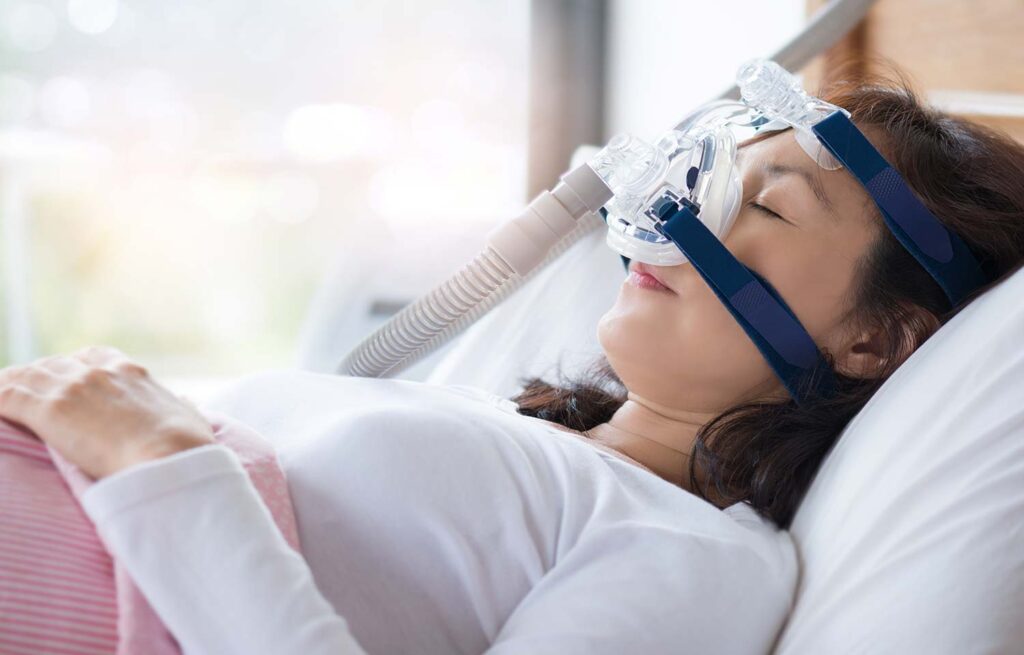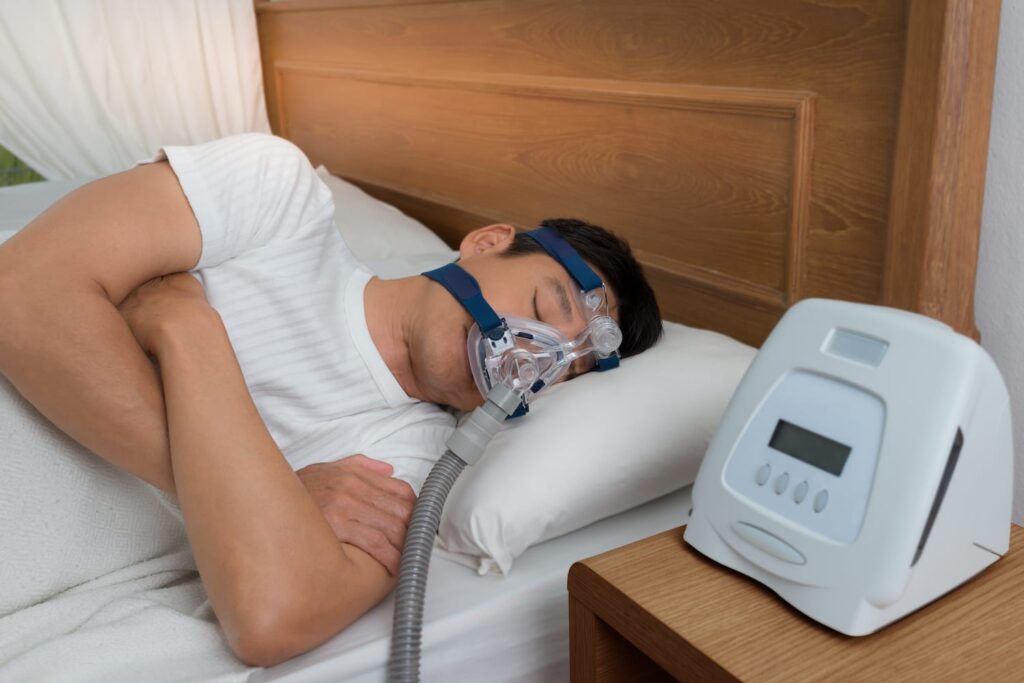Sleep apnea, particularly obstructive sleep apnea (OSA), is more than just an inconvenience for those who suffer from it. This common condition causes breathing to stop and start repeatedly during sleep, leading to fragmented sleep and a range of associated health problems. One of the most significant risks is its impact on heart health. Heart disease is a major concern for individuals with untreated sleep apnea, but CPAP (Continuous Positive Airway Pressure) machines have proven to be a crucial tool in not only managing sleep apnea but potentially reducing the risk of heart disease. In this article, we will explore how CPAP machines work, how they help with sleep apnea, and how their use can have a positive effect on heart health.
What is Sleep Apnea and How CPAP Machines Help
Sleep apnea is a sleep disorder in which a person’s breathing repeatedly stops and starts during sleep. These interruptions in breathing can occur hundreds of times a night, leading to a decrease in oxygen levels in the blood and an increase in carbon dioxide. This, in turn, puts significant strain on the heart and other vital organs.
There are three main types of sleep apnea:
- Obstructive Sleep Apnea (OSA): The most common form, caused by a blockage of the airway, usually when the muscles in the back of the throat relax too much during sleep.
- Central Sleep Apnea: Occurs when the brain fails to send the proper signals to the muscles that control breathing.
- Complex Sleep Apnea: A combination of both obstructive and central sleep apnea.
CPAP machines are primarily prescribed for people with Obstructive Sleep Apnea (OSA). They work by delivering a continuous stream of air through a mask to keep the airway open, ensuring that the person breathes normally throughout the night. By preventing the breathing pauses caused by sleep apnea, CPAP machines help improve sleep quality, reduce the negative impacts of sleep apnea on the body, and ultimately reduce the risks associated with heart disease.
See more: Melbourne Bulk-Bill Sleep Study: Sleep Help That Fits Your Budget
Types of CPAP Machines
CPAP machines come in several types to meet different needs. The most common types are:
- Standard CPAP (Continuous Positive Airway Pressure):
- How it Works: Delivers a continuous, fixed pressure of air throughout the night to keep the airway open.
- Benefits: Simple, effective, and the most widely used treatment for OSA.
- Limitations: Fixed pressure may not adjust to fluctuations in breathing during sleep.
- Auto-CPAP (Auto Adjusting CPAP):
- How it Works: Automatically adjusts the air pressure based on detected changes in your breathing throughout the night.
- Benefits: Offers more comfort by providing a customized experience. The pressure increases or decreases according to your needs.
- Limitations: More expensive than standard CPAP machines.
- BiPAP (Bilevel Positive Airway Pressure):
- How it Works: Provides two levels of air pressure—one for inhalation and a lower one for exhalation.
- Benefits: Ideal for individuals with complex sleep apnea or those who find it hard to exhale against a fixed pressure.
- Limitations: BiPAP machines are typically more expensive and complex to use compared to standard CPAP devices.
How to Choose the Right CPAP Machine
When selecting a CPAP machine, it’s essential to consider your specific needs and preferences. Here are some tips:
- Comfort: Look for machines that offer customizable features like ramp functions (gradually increasing air pressure), adjustable humidity, and different mask options.
- Noise Level: Choose a quieter machine if noise is an issue. Many modern CPAP devices are designed to operate with minimal sound.
- Portability: If you travel often, consider a compact and lightweight CPAP machine that’s easy to carry.
- Price: Standard CPAP machines are usually more affordable than Auto-CPAP and BiPAP machines, but your comfort and therapeutic needs should take priority.
Consulting with your healthcare provider is important to ensure you’re selecting the machine that best suits your condition.
CPAP Machine Setup and Usage
To get the best results from your CPAP machine, it’s important to set it up properly and use it consistently. Here’s how:
- Unbox and Assemble: Connect the CPAP machine to the power source and attach the tubing to both the machine and the mask. If your machine has a humidifier, fill the water chamber with distilled water.
- Adjust the Settings: For standard CPAP machines, your doctor will prescribe the pressure settings. Auto-CPAP machines will automatically adjust the pressure based on your needs.
- Fit the Mask: Choose the right mask (nasal, full-face, or nasal pillows) and ensure it fits comfortably and securely to prevent air leaks.
- Start Using the Machine: Turn the machine on before bedtime, and use it every night, including for naps. Consistent use is key to reducing the risks associated with sleep apnea.
Troubleshooting Tips:
- Air Leaks: If air leaks occur, check the mask for a proper fit, and adjust the straps or mask positioning.
- Dry Mouth: Use a heated humidifier or try a full-face mask to prevent mouth breathing.
- Noise Issues: Ensure the CPAP machine is placed on a stable, flat surface to reduce vibrations and noise.
CPAP Machine Accessories and Maintenance
Using the right accessories and maintaining your CPAP machine properly is vital for its performance. Essential accessories include:

- Masks: Choose a mask that fits well and is comfortable for long-term use. Clean your mask daily to prevent bacteria buildup.
- Tubing: Clean the tubing weekly with mild soap and water to prevent mold and bacteria growth. Replace the tubing every 6 to 12 months.
- Filters: Replace the air filter regularly, typically once a month, to ensure clean airflow.
- Humidifiers: If using a humidifier, clean it weekly to avoid mold and bacteria buildup.
Regular maintenance ensures that your CPAP machine continues to provide effective therapy.
Benefits of Using a CPAP Machine
Using a CPAP machine offers numerous health benefits beyond just improving sleep quality:
- Improved Sleep Quality: CPAP therapy eliminates sleep apnea events, allowing you to experience deeper, more restorative sleep.
- Reduced Risk of Heart Disease: Sleep apnea is linked to an increased risk of heart disease, high blood pressure, and stroke. CPAP therapy helps lower these risks by ensuring adequate oxygen levels during sleep.
- Increased Daytime Energy: Better sleep translates to more energy and alertness during the day, improving focus and productivity.
- Reduced Snoring: CPAP machines significantly reduce or eliminate snoring, benefiting both the user and their partner.
Common CPAP Machine Problems and How to Solve Them
While CPAP machines are generally effective, users may encounter common issues. Here’s how to address them:
- Air Leaks: Ensure the mask is tightly sealed. Adjust the mask straps or switch to a different mask style for a better fit.
- Dry Mouth: A heated humidifier can help alleviate dryness, or consider switching to a full-face mask to prevent mouth breathing.
- Discomfort: Experiment with different mask types and try cushion pads for additional comfort.
Cost of CPAP Machines and Insurance Coverage
CPAP machines vary in cost depending on the type and features:
- Standard CPAP Machines: Typically cost between $200 and $800.
- Auto-CPAP Machines: Range from $500 to $1,500.
- BiPAP Machines: Can cost upwards of $1,000.
Insurance Coverage: Many insurance plans cover CPAP machines when prescribed by a healthcare provider. Be sure to check with your insurance provider to confirm coverage details and any out-of-pocket costs.
Conclusion
CPAP machines are a vital part of managing sleep apnea, and they offer several benefits that extend beyond improving sleep quality. By ensuring that your airway stays open throughout the night, CPAP therapy reduces the risks of heart disease, improves daytime energy, and enhances overall health. Choosing the right CPAP machine, maintaining it properly, and using it consistently are key to achieving the best results. If you’re concerned about sleep apnea and heart disease, it’s essential to consult with your healthcare provider to determine if CPAP therapy is right for you.

